
|
Project: Capacity Building of NAPA for Open Local Governance
Activity: Interactive Training Seminar for NAPA Trainers/Lecturers (6 x 1-day seminars – a different, newly developed teaching module presented every day)
Date: November 7 - 12, 2016 Venue: National Academy of Public Administration, ulitsa Eugene Pottier, 20, Kyiv, Ukraine Language: English 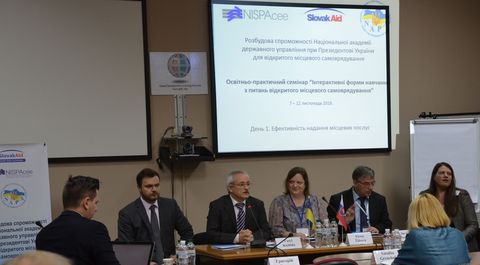 NISPAcee Resource Team:
Juraj Nemec Daniel Klimovský Tomáš Jacko Elena Žáková NAPA Resource Team: Volodymyr Vakulenko Nataliia Grynchuk Hryhorii Borshch Selection criteria for participants: - Work at NAPA. - Relevant practice as trainer / lecturer. - Duration of practice. - English language advantage. Purpose: - Familiarisation with newly developed teaching modules and materials with the aim to include them in the existing NAPA teaching materials and modules and to run them for NAPA students and lecturers. - Commenting on developed modules and materials. Outputs: - Ability to lead future trainings on selected teaching modules on open governance for NAPA students. - Commenting on teaching modules and materials. - Proposals of case studies. Methodology: - Presentations: the authors of the module will present the topic and its relevance generally and specifically under Ukrainian conditions. - Discussions: after the presentation of the topic and its relevance, all participants discuss the proposed contents of the module. - Case studies method: in the second part, the whole group will split into smaller working groups and work with cases studies from Slovakia: group work. - Commenting: representatives of all groups comment on the purposefulness and usefulness of proposed cases. --- Teaching module: Efficiency in Local Service Delivery Day: Monday / November 7, 2016 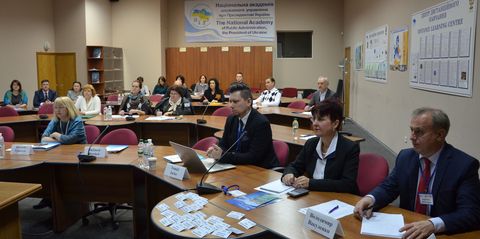 Purpose: To provide systematic knowledge about the ways in which local governments should decide on the most important aspects of local public services delivery, with the focus on deciding how to produce local services.
Outputs: - Understanding of the essence of the concepts of local public service delivery.
- Awareness of the scope of local public services in Ukraine and rules for their delivery. - Awareness regarding the core necessary municipal decisions regarding local public service delivery. - Awareness of the main principles of deciding between in-house and external supplying of local public services. - Ability to evaluate concrete local approaches and solutions. 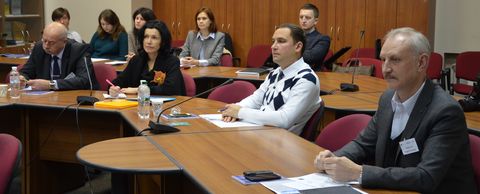 Programme:
Welcome Introduction of the project, aims of the workshop, expected outcomes Introduction of the responsible experts and participants Introduction to the module Local service delivery in Slovakia Local service delivery in Ukraine Presentation of the module. Main topics: - Delivery of local services – theory. - Efficiency in local service delivery (economy, efficiency and effectiveness + quality). - Measuring efficiency in local service delivery – cost minimisation, multi-criteria evaluations, Data Envelopment Analysis. - Public – private – civil sector mix in production of local public services. - Pros and cons of all forms of externalisation of production of services, how to decide. - Factors determining final efficiency of local public services. - Principal-Agent Theory and Contracting. - Transaction Costs and Contracting. - Contracting Out in Transitional Countries. - In-house versus external supply. - Model of decision-making process. - Possible ways of evaluation of local public service delivery. - Co-creation and co-production of local public services. Working with Slovak case studies: Group work Sharing experience with case studies Discussion about Ukrainian case studies Final discussion on the module, conclusions  ---
Teaching module: Transparency, Openness, Intelligibility Day: Tuesday / November 8, 2016 Purpose: To provide knowledge about the key concepts of transparency, openness and intelligibility. The module focuses on designing new transparency, control and accountability arrangements and identifying their weaknesses and strengths. Outputs: - Understanding of the difficulty and importance of defining transparency, openness, intelligibility, accountability and corruption. - Awareness of the ways in which to measure transparency, openness, intelligibility and corruption. - Understanding of the causes and impact of lack of transparency, openness, intelligibility. - Ability to fight corruption through increase of transparency, openness and intelligibility. - Knowledge of anti-corruption local reforms - from Slovakia and abroad. 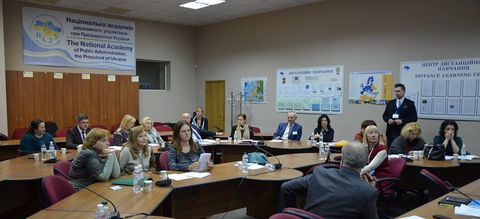 Programme: Welcome Introduction to the module Transparency, openness, intelligibility in Slovakia Transparency, openness, intelligibility in Ukraine Presentation of the module. Main topics: - Defining key concepts: transparency, openness, intelligibility, accountability and corruption. - Measuring transparency, openness, intelligibility and corruption. - The causes and impact of corruption. - How to increase transparency, openness, intelligibility and how to fight corruption. - Decentralisation and the risks of corruption, corruption sensitive areas and the possibilities of their analysis: public procurement, grants, human resources, municipal enterprises. - Anti-corruption local reforms. Experience from Slovakia and abroad, conditions for success. Working with Slovak case studies: Group work Sharing experience with case studies Discussion about Ukrainian case studies Final discussion on the module, conclusions --- Teaching module: Performance Budgeting Day: Wednesday / November 9, 2016 Purpose: To provide systematic knowledge and to train skills about how to formulate (programme) performance budget for a public body.  Outputs: - Understanding of the essence of concepts of (programme) performance budgeting.
- Awareness about pros and cons of (programme) performance budgeting, including existing experience from the CEE region. - Awareness of actual Ukrainian legislation on the topic. - Ability to propose programmes, targets and indicators for (programme) performance budgets for public bodies. Programme:
Welcome Introduction to the module Performance budgeting in Slovakia Performance budgeting in Ukraine Presentation of the module. Main topics: - Performance budgeting versus (programme) performance financing and their systemic problems. - Distinction between programme performance budgeting as the method for preparing budgets and performance financing as the tool to allocate public resources. - Pros and cons of programme performance budgeting (plus existing experience, current approaches and purposes for its failure in our region). - International experience with performance budgeting. - Implementing (programme) performance budgeting. - Programmes/activities/Inputs, outputs, outcomes/Goals, indicators and targets - Methodology of proposing and measuring targets and indicators. - Possible "extras”: Pros and cons of performance financing of public organisations – with the focus on the pervasive effects of wrongly implemented schemes. Pros and cons of performance payments of employees of public organisations. Working with Slovak case studies: Group work Sharing experience with case studies Discussion on Ukrainian case studies Final discussion on the module, conclusions ---- Teaching module: Citizen Engagement Day: Thursday / November 10, 2016 Purpose: To provide relevant knowledge with regard to the inclusion and participation of citizens in policy making and to train skills relating to these tools, which bring about opportunities for more collaborative and open governance. Outputs: - Ability to evaluate concrete local approaches and solutions. Understand both the importance of public/citizen participation and engagement in policy making processes. - Awareness of the pros´ and cons´ of inclusion and participation/engagement of citizens within the relevant stages of policy cycles. - Familiarity with the present relevant Ukrainian and Slovak legislation, as well as European recommendations. - Readiness to propose participatory tools for more efficient or higher public/citizen participation/engagement.  Programme: Welcome Introduction to the module Citizen engagement in Slovakia Citizen engagement in Ukraine Presentation of the module. Main topics: - Citizen engagement, its pros´ and cons´. - Legal provisions with regard to citizen engagement in the Ukraine and Slovakia. - Comparison and discussion on legal provisions. Working with Slovak case studies: Group work Sharing experience with case studies Discussion on Ukrainian case studies Final discussion on the module, conclusions --- Teaching module: Identification of Local Leaders / Local Leadership Day: Friday / November 11, 2016 Purpose: To provide knowledge about what local leadership is and to set out key prerequisites for good local leaders who pursue both democracy and efficiency at the same time.  Outputs: - Understanding of the theoretical approaches to leadership and leadership theories. - Awareness of the nature of managerial work and role. - Knowledge of charismatic leadership and both the opportunities and threats associated with it. - Understanding of other relevant concepts: leadership and organisational culture, cultural development, and leaders vs. managers in public organisations. Programme: Welcome Introduction to the module Identification of local leadership in Slovakia Identification of local leadership in Ukraine Presentation of the module. Main topics: - Leadership Theories in Management and Organisational Behaviour. - The Nature of Managerial Work and Role. - Charismatic Leadership: opportunities and threats. - Leadership and Organisational Culture. - Leading Cultural Development. - Leaders and Managers in Public Organisations. Working with Slovak case studies: Group work Sharing experience with case studies Discussion on Ukrainian case studies Final discussion on the module, conclusions --- Teaching module: Participatory Budgeting Day: Saturday / November 12, 2016 Purpose: To provide the relevant knowledge with regard to participatory budgeting and to train the skills necessary for dealing with participatory budgeting. 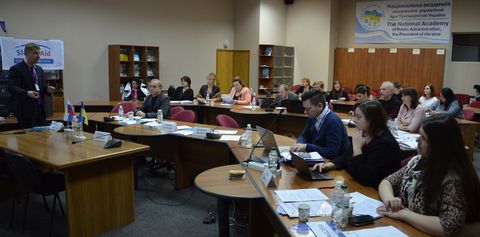 Outputs: - Understanding of the background of participatory budgeting. - Awareness of the pros´ and cons´ of participatory budgeting. - Familiarity with the present relevant Ukrainian and foreign experience. - Capacity and readiness to propose the relevant tools for the implementation of participatory budgeting.  Programme: Welcome Introduction to the module Participatory budgeting in Slovakia Participatory budgeting in Ukraine Presentation of the module. Main topics: - Participatory budgeting, its pros´ and cons´. - How to use the matrix of threats/risks. - Elaboration of the matrix of threats/risks with regard to participatory budgeting. Working with Slovak case studies: Group work Sharing experience with case studies Discussion about Ukrainian case studies Final discussion about the module, conclusions |
© NISPAcee 2021
Web design and administration by Jan Andruch / FLOYD-Studio.com